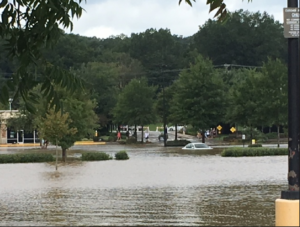 Many of the unwelcome changes we are seeing in parts of Chapel Hill are because of zoning and development review changes made over the last decade. Some believed that simplifying or doing away with regulations would yield new investment and redevelopment that would in turn yield affordable housing and a vital walkable community. While less costly development is a desirable goal, it’s important that we retain the tools to promote careful development that provide adequate stormwater management, tree protection, and all the other things that make Chapel Hill a desirable place to live.
Many of the unwelcome changes we are seeing in parts of Chapel Hill are because of zoning and development review changes made over the last decade. Some believed that simplifying or doing away with regulations would yield new investment and redevelopment that would in turn yield affordable housing and a vital walkable community. While less costly development is a desirable goal, it’s important that we retain the tools to promote careful development that provide adequate stormwater management, tree protection, and all the other things that make Chapel Hill a desirable place to live.
For example, the Ephesus-Fordham (now “Blue Hill”) form-based code removed the public hearing process and allows only a time-limited review of development proposals by the Town Manager. Streamlining the review process did not deliver the hoped for affordable housing nor other community benefits; a one-bedroom apartment in the Berkshire next to Whole Foods—the first project completed under the new zoning—rents for $1800 a month. Anything but a walkable community was achieved as each new project brought its own parking deck.
However, the most serious consequence of having eased regulations and streamlined development review in the Ephesus-Fordham district has been to make flooding worse in Chapel Hill. By greatly simplifying what was required and removing the Resource Conservation District overlay, the developer RAM was allowed to raise the land level for the Fordham Apartments by 2 1/2 feet immediately adjacent to Booker Creek where the old Days Inn was located. This caused more extensive flooding to shops and stores in Eastgate during Hurricane Florence.
The good old public hearing and special use permit process, instead of the simplified form-based code that replaced it, would have required construction of a planned storm water storage facility in the district before Fordham Apartments was built, in order to reduce the impact of flooding on adjacent properties.
This video shows what happened during Florence in the vicinity of the Fordham Apts project. As Booker Creek overflowed and flooded Eastgate, the river of flood water ran into the elevated land. Instead of draining off more quickly into the stream channel, the water backwashed against the buildings flooding several local businesses. RAM claims they cannot be held liable for the damage they inflicted on their neighbors because the Town government approved their project.
